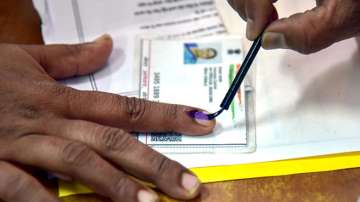Religious polarisation, NRC key factors in upcoming West Bengal bypolls
Religious polarisation, National Register of Citizens (NRC) and the vote-catching capacity of a renewed Congress-Left Front alliance could be the game changers as principal rivals Trinamool Congress and the BJP battle it out in the bypolls to three Assembly seats in West Bengal to be held on Monday.

Religious polarisation, National Register of Citizens (NRC) and the vote catching capacity of a renewed Congress-Left Front alliance could be the game changers as principal rivals Trinamool Congress and the BJP battle it out in the bypolls to three Assembly seats in West Bengal to be held on Monday.
The by-elections, the first test of popularity for the state's political opponents after the Lok Sabha polls, are being held in the backdrop of the tumultuous political developments in Maharashtra.
However, back in Bengal, the bypolls are not going to bring about any change of government, yet that fact has by no means diminished their significance.
In fact, poll watchers feel, with the state's politics standing at the crossroads, the results and voting trends in the three Assembly constituencies -- Kaliaganj, Karimpur and Kharagpur Sadar -- could to some extent shape the future course of events in the run up to the 2021 Assembly polls.
The general elections earlier this year saw an unbelievable emergence of the BJP in a state, where it had been shaky and a fringe player for over three and a half decades. The party not only pushed up its seat tally from 2 to 18, but also raised its vote share to 40 per cent, more than double of what it got five years back.
On the other hand, the Mamata Banerjee-led Trinamool Congress, which had been winning all elections with a thumping majority since coming to power in 2011, saw its seat count dip to 22 from the 34 it won in 2014. The Congress managed two seats, while the Left Front drew a blank.
The Trinamool has since then roped in poll strategist Prashant Kishor, and on his suggestion, rolled out several mass outreach programmes, including the much-talked about 'Didi Ke Bolo' (Talk to 'Didi', as Banerjee is fondly called) initiative, which is a helpline for people to reach out to the government with their grievances.
The elections thus provide the ruling party an opportunity to gauge to what extent it has managed to improve its position.
As for the BJP, its performance would be an indicator of whether it has retained or further consolidated the public support it got back in April-May, or its stupendous show then was only a nine-day wonder.
The fact that two of the bypoll bound constituencies -- Kaliaganj in North Dinajpur district and Kharagpur Sadar in West Midnapore -- gave massive leads to heavyweight BJP candidates, Union Minister of State Debasree Chowdhury and state BJP chief Dilip Ghosh, in the Lok Sabha elections makes the coming battle virtually a matter of prestige for the state party leadership.
Chowdhury won from Raiganj and Ghosh from Midnapore. Karimpur, however, had given a decent margin to the Trinamool Congress.
The BJP, which reaped the fruits of communal polarisation in the Lok Sabha polls by rallying a huge number of Hindu votes behind it, is hoping to do an encore and repeat its successes in Kharagpur and Kaliaganj.
Even in Karimpur, analysts feel the polarisation -- both social and religious -- has only increased, making the seat a touch-and-go affair.
In such a scenario, the entry of the Congress-Left alliance could end up queering the pitch further for the Trinamool, with Left Front major CPI-M fielding a Muslim candidate, Golam Rabbi.
Realising that Rabbi -- the only Muslim among the four candidates in fray -- could put Trinamool in trouble if he can wean away a substantial number of votes from the minority community, the party's campaign general in Karimpur -- Lok Sabha MP Mahua Moitra -- has scathingly attacked the Congress-Left combine at every meeting, calling them "agents of the BJP".
Besides, Moitra was also heard telling Muslims that it is "a battle for your survival" as only the Trinamool and Mamata Banerjee could give them protection, highlighting BJP's claim of drawing up an NRC in Bengal.
Moitra used the NRC card to woo the Hindus too, as she pointed out that "13-14 lakh Hindus figured among the 19 lakh people excluded from the NRC in Assam."
In fact, Trinamool's high-pitched campaign and the recent statewide panic about NRC have forced the BJP to downplay the issue during the bypolls campaign as it feared losing out on its core Hindu vote bank.
Instead, the BJP campaigned big on the Citzenship Amendment Bill to assure the Hindus.
For the Congress-Left alliance, the main target is to stop the continuing erosion in the vote banks of the CPI-M and the Congress. Though its candidates -- those of the Congress in Kharagpur and Kaliaganj and CPI-M in Kharagpur -- are not being rated as winning horses by the political pundits, they are been keenly watched.
If the combine can get back even some portion of the around 26-27 per cent votes it lost to the BJP, the saffron party would be hard hit.
On the other hand, if a portion of Trinamool's Muslim voters cross over to the new alliance, the ruling party's prospects would take a beating.
The bypolls at Kharagpur Sadar and Karimpur were necessitated after sitting MLAs Dilip Ghosh and Mahua Moitra got elected to the Lok Sabha.
The bypoll in Kaliaganj is the fallout of the death of Congress MLA Pramath Nath Roy.
Over 7.34 lakh voters are eligible to express their choice in 81 polling stations to choose their representatives from among 18 candidates -- three of them women. Fifteen companies of central forces have been deployed to keep things under control.